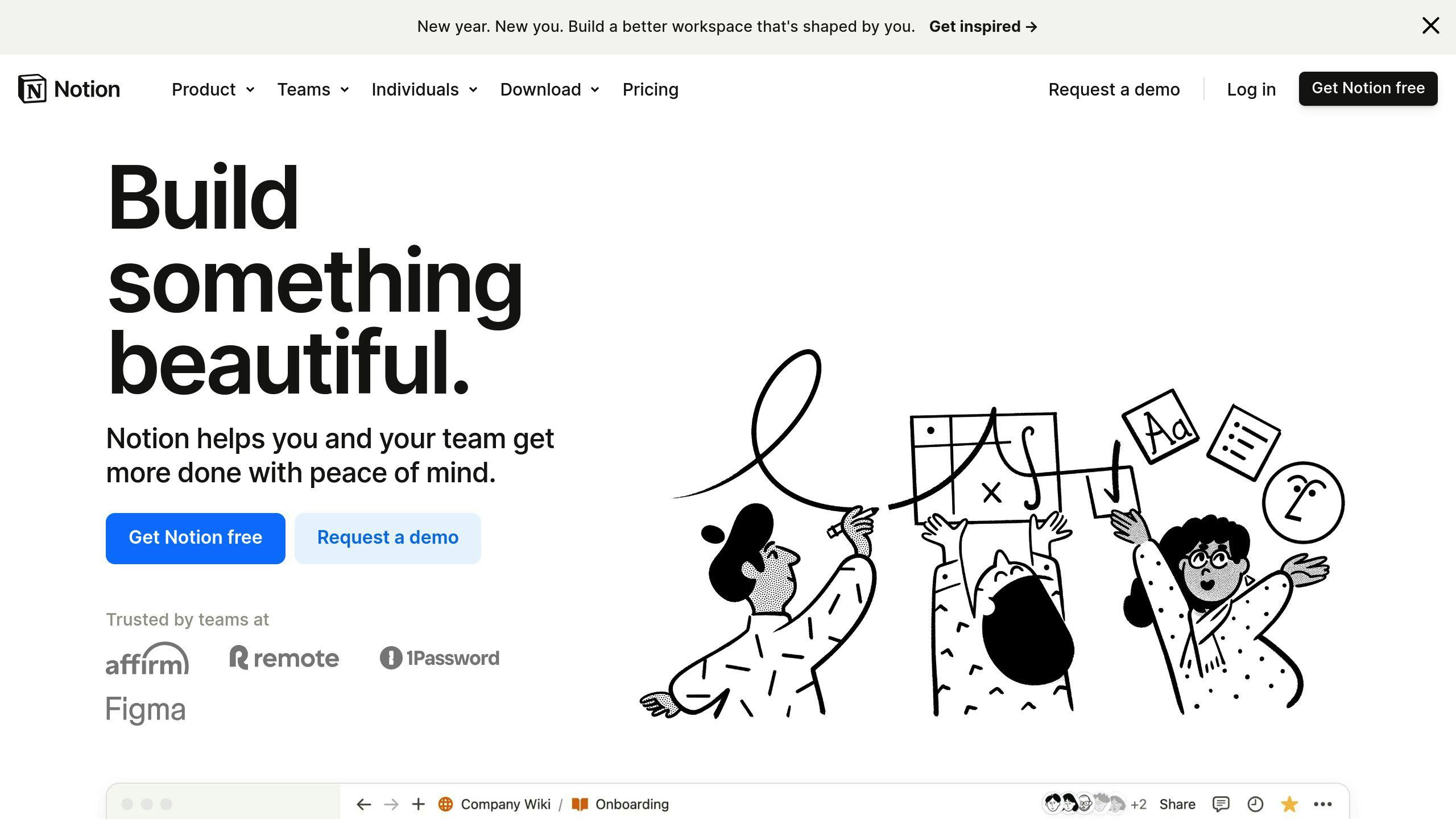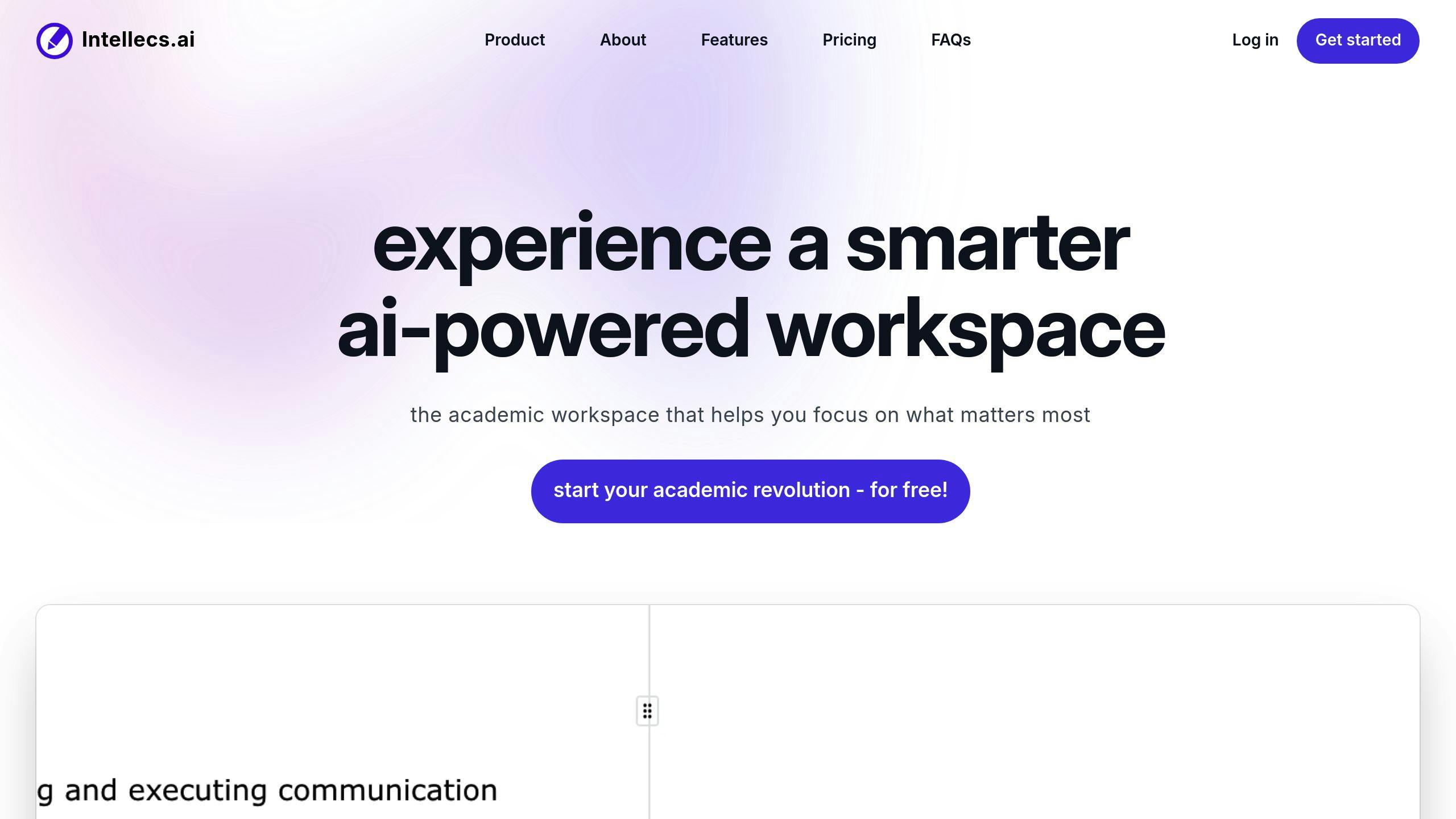The Evolution of Personal Knowledge Management Tools
Explore the evolution of personal knowledge management tools, comparing their features and benefits for academic and research purposes.

Key Highlights:
- Intellecs: AI-powered research assistant, smart writing tools, and PDF analysis for academic tasks.
- Notion: Flexible templates, AI summarization, and collaborative tools for organizing coursework and projects.
- Obsidian: Advanced linking, knowledge graph visualization, and local storage for in-depth research and privacy.
Quick Comparison Table:
| Tool | Best For | Key Features | Downsides |
|---|---|---|---|
| Intellecs | Research and writing tasks | AI research assistant, PDF analysis, smart writing | Subscription needed for full features |
| Notion | Coursework and collaboration | Databases, AI summarization, integrations | Limited offline functionality |
| Obsidian | Research-heavy projects | Knowledge graph, Markdown support, local storage | Steep learning curve |
Each tool caters to different academic needs, from simplifying research to organizing complex projects. Choose based on your goals, whether it's collaboration, privacy, or automation.
Notion VS Obsidian - Why I Use BOTH

1. Intellecs

Intellecs is an AI-powered platform tailored for academic work and research. It blends smart note-taking with advanced research tools to create a focused learning environment.
At its heart, Intellecs uses a block-based editor. This allows students to organize content - like lecture notes, research summaries, or project outlines - into modular blocks. These blocks can be rearranged easily to fit different study needs. Plus, the platform’s AI suggests tags and links between notes, helping users build a connected knowledge base.
The standout feature is its AI Research Assistant, which scans academic sources, extracts key points, and creates summaries. This can save up to 70% of the time typically spent on literature reviews, turning dense academic papers into structured, digestible summaries.
| Feature | Benefit |
|---|---|
| AI Research Assistant | Cuts literature review time by 70% |
| Smart Document Organization | Saves 40-50% of structuring time |
| PDF Analysis | Extracts concepts, saving 50-60% of time |
Intellecs also includes smart writing tools that go beyond grammar checks. These tools suggest style improvements and paraphrasing tips to boost clarity and coherence. Johan Klarin of Lund University shares:
"AI tools serve as particularly effective supportive aids for students who struggle with cognitive processes crucial for academic success."
Collaboration is another strong point. Intellecs offers secure tools for sharing notes and building group knowledge bases, making it ideal for team-based learning. The platform is available in two tiers:
- A free plan with essential tools like the block-based editor and basic research aids
- A premium plan offering advanced features, including a full AI PDF reader and enhanced writing tools
2. Notion
Notion stands out as a powerful tool for organizing and collaborating on academic projects. Its block-based interface lets students build dynamic workspaces tailored to their needs, offering flexibility and ease of use.
One standout feature is its AI integration, which boosts productivity by analyzing content and offering relevant suggestions. For instance, it can condense a lengthy 10-page research paper into a concise 200-word summary, highlighting the key points and arguments. This helps students digest information faster and connect ideas across their study materials more effectively.
| Feature Category | Capabilities |
|---|---|
| Knowledge Organization | Databases, Wikis, Kanban boards |
| AI Tools | Smart summarization, Content suggestions |
| Collaboration | Real-time editing, Comments, Shared workspaces |
| Academic Integration | Reference tracking, Assignment management |
Notion's database tools are especially useful for academic tasks. Students can design custom databases to manage research, track assignments, and organize study materials. With multiple viewing options - like tables, calendars, and Kanban boards - Notion accommodates different study methods and project needs.
The platform is accessible, offering a free plan alongside affordable premium options. With more than 20 million users worldwide [1], it has become a go-to solution for academic organization and teamwork.
"Notion's AI features help students automate routine tasks, allowing them to focus on higher-level thinking and learning" [4].
For academic projects, Notion shines in project organization. Students can set up dedicated spaces for each course, link related resources, and maintain a cohesive knowledge base. Its integrations with tools like Google Drive and Zotero further simplify research workflows, making it an essential tool for students aiming to streamline their academic efforts.
3. Obsidian
Obsidian takes personal knowledge management to the next level with its structured and hierarchical approach to organizing research. Its nested folder system allows students to create detailed categories that align with the natural structure of academic subjects.
Unlike Notion's adaptable templates or Intellecs' research assistant features, Obsidian focuses heavily on customization and visual knowledge mapping. The AI integration adds another layer of functionality by offering features like automatic content summarization and smart categorization, helping students save time and focus on deeper analysis.
| Feature | Academic Use |
|---|---|
| Markdown Support | Ideal for LaTeX equations, citations, and detailed research notes |
| AI-Powered Organization | Automates tagging and categorizing content |
| Knowledge Graph | Maps visual connections between concepts |
| Local Storage | Provides offline access and secure data storage |
Obsidian also boasts a robust plugin ecosystem, making it compatible with citation managers and research databases. This creates an all-in-one environment for handling academic projects.
"Expert insights from knowledge management experts emphasize the importance of personal knowledge management in enhancing productivity and collaboration" [3].
For research-heavy projects, Obsidian's hierarchical system is a game-changer. Students can create thorough outlines for dissertations, connect related research materials, and maintain detailed literature reviews. Its structured approach to note-taking is especially useful for long-term projects that demand clarity and organization [5].
One standout feature is the graph view, which visualizes the relationships between notes. This helps students uncover patterns and connections, particularly in interdisciplinary or complex research topics [2].
Obsidian's free version includes essential features, making it a great option for students. For those needing more advanced tools, premium upgrades are available. However, its steep learning curve might be a drawback for some users - a topic we’ll dive into further in the next section.
Advantages and Disadvantages
Choosing the right personal knowledge management (PKM) tool means weighing its strengths and weaknesses to match your specific needs. Each platform brings something different to the table, but they also come with limitations that could affect your experience.
| Tool | Advantages | Disadvantages |
|---|---|---|
| Intellecs | • AI-powered auto-tagging and smart linking system • Neural search with concept recognition • AI writing assistant with academic style suggestions • Real-time PDF analysis with key concept extraction |
• Requires subscription for full features • Limited collaboration options • Newer platform with developing features • Less extensive template library |
| Notion | • Real-time multi-user editing with version history • AI-driven content summarization and organization • Cross-platform database management • Extensive third-party integrations |
• Complex interface for new users • Performance issues with large databases • Limited offline functionality • Basic AI features compared to specialized tools |
| Obsidian | • Interactive knowledge graph visualization • Secure local-first storage • LaTeX and citation support • Community-driven plugin ecosystem |
• Complex setup process and markdown requirements • Limited cloud sync in free version • Technical interface design • Requires programming knowledge for customization |
Your choice ultimately depends on how these pros and cons align with your academic needs.
Security is another key factor, especially for students handling sensitive research data. Obsidian uses local storage to prioritize privacy, although this limits multi-device access. On the other hand, Notion and Intellecs offer cloud-based options with encryption for secure data management.
When it comes to integrations, each platform caters to different priorities. Notion works well with productivity tools, making it great for managing tasks and schedules. Obsidian stands out with research-focused plugins, while Intellecs leans heavily into AI-powered tools for document analysis and research assistance.
For academic users, the decision often boils down to specific goals. Obsidian’s bidirectional linking is perfect for complex research projects, Notion's database features shine for organizing coursework, and Intellecs offers automated research tools, though its collaboration features are still maturing.
Premium upgrades vary across platforms, so it’s important to assess whether the additional features justify the cost. These tools, with their AI-driven capabilities, can help students manage knowledge more efficiently, despite their individual limitations.
Conclusion
The rise of AI-powered PKM tools is reshaping how students and researchers manage and use information in academic settings. These tools are evolving to meet the demands of modern academic workflows, offering tailored solutions for different needs.
Obsidian stands out for handling research-heavy tasks, especially for users managing intricate, interconnected projects. Its focus on local storage and support for LaTeX makes it a great choice for researchers handling sensitive data or working with mathematical equations.
Notion bridges personal and group knowledge management. With its collaborative tools and AI features, it’s well-suited for managing coursework, group assignments, and other shared academic tasks.
Intellecs represents a newer wave of AI-driven tools designed specifically for academic use. Its neural search and AI-powered concept recognition simplify research and enhance learning. While still developing, its specialized features make it a promising option for students seeking automated research assistance.
As AI capabilities advance, PKM tools are expected to become even more powerful in supporting academic work. Choosing the right tool depends on individual needs, such as:
- Data security: Ensuring sensitive information is protected.
- Collaboration: Meeting the demands of group tasks or solo projects.
- Ease of use: Matching the tool’s complexity with the user’s comfort level.
For students and researchers, the best PKM tool is the one that aligns with their specific academic goals. As these platforms continue to grow, their role in boosting productivity and improving knowledge management will only expand further.
FAQs
Here are answers to some common questions about AI-powered Personal Knowledge Management (PKM) tools and how they can be used effectively:
How can students use AI to take notes?
AI tools like Jamworks make it easier for students to turn lecture content into useful study materials. These tools can summarize lectures, refine notes, and organize them visually. To get the most out of AI for note-taking:
- Use AI to create quick summaries of lecture content.
- Review and improve the notes generated by the AI.
- Organize information with tools like knowledge graphs.
- Include multimedia elements like images or videos to enhance learning.
What is an AI productivity tool?
AI productivity tools are designed to automate tasks and simplify workflows. They can help with:
- Managing emails and schedules.
- Summarizing documents quickly.
- Organizing information automatically.
- Offering intelligent search features.
For example, Intellecs.ai includes features like an AI research assistant and a smart PDF reader, making it easier to handle research and writing tasks.
How is Obsidian different from Notion?
Obsidian and Notion serve different purposes, and their features reflect this:
| Feature | Obsidian | Notion |
|---|---|---|
| System Architecture | Local files with knowledge graph linking | Cloud-based database structure |
| Content Format | Pure Markdown with full offline access | Custom blocks with limited offline use |
| Organization Method | Bi-directional linking with visual connections | Linear database organization |
Obsidian’s knowledge graph is particularly useful for research and academic work. It helps users see connections between notes, which can lead to new insights and a better understanding of complex topics.
As AI technology improves, tools like these will play an even bigger role in academic and professional success.





